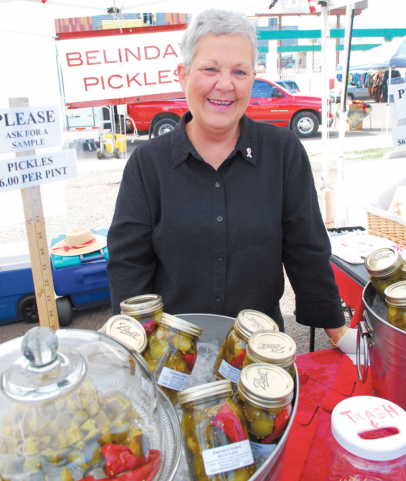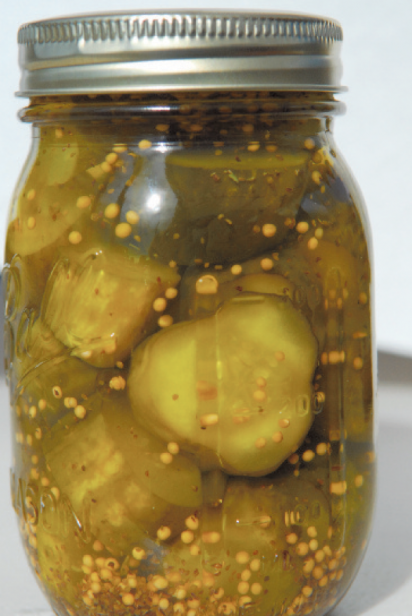Starting a Home-Based Food Business
"This is the best ice cream I've ever had. You should sell this." I heard those words every time I served my cookie ice cream concoction.
Really? I should sell ice cream? Who would buy my weird flavored ice cream creation? Or my killer chocolate chip cookies or Nutella™-filled cupcakes or any of the other delectable foods I regularly share with friends and family? Obviously I lack the entrepreneurial drive that motivates some people to take their homemade foods to market. Thankfully, many local folks do possess that entrepreneurial spirit and have the confidence to invest in their food, so we have great locally made barbecue sauces, tamales, pickles, salad dressings, ice creams, brownies, granola and chocolate, just to name a few.
Belinda Powell, aka The Pickle Lady, is one of those entrepreneurial folks. Her spicy sweet pickles can be found at farmers' markets around town as well as at the Phoenix Public Market.
Belinda started making pickles from an old family recipe over 30 years ago. She brought the jars of sweet and spicy pickles to church dinners and gave them as gifts for family and friends. As is usually the case with a yummy homemade delicacy like those pickles, people asked to buy jars of them. Although she hadn't previously thought about selling them, Belinda realized she might be on to something that could help send her kids through school.
In 1990, Belinda started to investigate the legalities of selling her pickles at farmers' markets and community events. She found out that she had to prepare her pickles in a county approved kitchen. She would need a processor's permit, a peddler's permit, city and state tax IDs and a special inspection of the vehicle she'd be using for transporting the pickles. Undaunted and determined to make it through the government's maze of rules and regulations, she persevered until she had all her permits and inspections behind her.
She estimates that she spent close to $500 on fees with the city, county and state and several months getting everything in order before she could process her first batch of pickles for sale.
So what about that salad dressing recipe that everyone raves about? Or those blueberry muffins you bake as gifts? Can you start selling them at farmers' markets and church bake sales? Not so fast for the salad dressing. Yes, for the muffins.
There are federal, state and county laws regulating the production and sale of foods to the public. As you'd expect, they're written in legal language that can be confusing. If your plan is to bake or make candy, then you're in luck. A new Arizona law, known as the "cottage industry food law" allows people to bake in their own homes for resale without having to get a permit for their kitchen or their vehicle. All you'll need is a food handler's card to get started, which you can obtain by passing a test administered by the Maricopa County Environmental Services Department.
According to Will Humble, Arizona Department of Health Services director, "The new law allows folks to bake food (not considered "potentially hazardous" as defined by our rules), in a home kitchen and be able to sell it commercially." (Information on "potentially hazardous" foods)
The cottage industry food law applies specifically to baked goods and confectionery so Aunt Mabel's salad dressing would not be covered under this law. For something like salad dressing or any other food considered potentially hazardous, you'd have to go through the regular permitting process like Belinda did for the pickles.
If you want to sell salad dressing or barbecue sauce or some other potentially hazardous food, the first step, according to Belinda, is to find a legally permitted place to prepare your food. Finding a kitchen to rent by the hour or by the day or longer is getting easier than it was when Belinda started out. In addition to approved kitchens in churches and synagogues where you might be able to rent space, there are other options sometimes referred to as "culinary incubators." These are permitted kitchens set up as businesses where properly licensed people can rent space to prepare food for resale (culinaryincubator.com/maps.php).
At one time finding an outlet for a homemade or artisan food would have been difficult, but with all the farmers' markets, fairs and other local events during the year, getting started is now a lot easier. So look through those old family recipes for something uniquely delicious and personal that you want to share and start cooking.
GETTING STARTED IN A HOME-BASED FOOD BUSINESS
If you are baking, you may bake out of your home kitchen without any other special inspections. Be sure to register with the state and follow all the rules outlined in this website.
If you are preparing food that is not baked, select a licensed commercial kitchen where you can legally prepare your food, and then have your transport inspected to obtain the needed licenses.
Get the proper sales tax IDs and business licenses and other permits mandated by law.
Consider taking out a liability insurance policy to protect yourself further.






